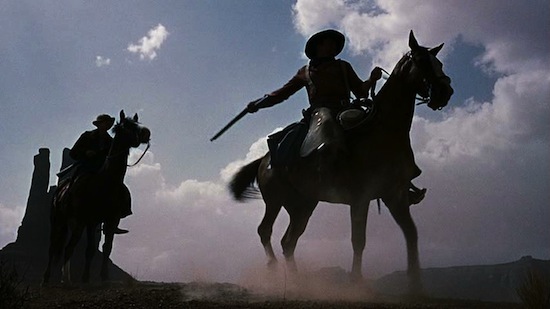At least that’s the way it works in movies. Leadership in the real world is a bit different. We don’t carry rifles and we don’t ride horses. Most of us aren’t big and tall. It’s no trick to lead when you’re a hero on a horse, but how about the rest of us, when we’re expected to lead in the real world from positions without giant authority?
“Lead without giant authority?” How do you do that?
Look at the image again. The camera is positioned below John Wayne, looking up at him. This is called a “low angle.”
Most of us are at a low angle in our work lives, yet we are expected to lead.
There are lessons I’ve learned from producing movies that translate into every field of endeavor. Because movie producers don’t really have that much power, but they have to lead. They don’t fully control the budget. They don’t tell the director what to do. They cannot command the star. But they are expected to lead… and they do.
How do producers lead from a low-angle? Here are five lessons from the producing trenches you can apply to your work life, no matter if you are in a big corporation or leading a small work group.
1. Form an emotional bond. Care about everyone equally, whether they rank above or below you. People feel your compassion, and the decision to be led starts with the heart, not the head.
2. Provide a financial incentive. Nothing perks people up like money. On a movie set, stars and directors have financial participations (and sometimes penalties) to get the work done and done well. In the corporate world, you can create a financial incentive with other corporate silos—this may seem counter-intuitive, in an era where turf-protecting is the norm, but it will get you a lot of support.
3. Articulate the big vision. Leadership goes to the person who speaks the vision best, regardless of where they are in the hierarchy.
4. Get your ego out of it. Replace the word “I” with “we.” As a corollary, don’t get worried when other people claim credit for your successes. That’s immaterial. What matters is the end-game, the result, and when you take your ego off the table, others will remove their egos, too.
5. Push for quality at all times. One of the best leaders I know is a post-production supervisor, which, technically, is not a tremendously lofty position in the chain-of-command. But she leads because she keeps asking, “How could this be better?” When she voices her considered opinion, people follow her.
It doesn’t matter if the other guy’s biceps are bigger than yours in the arm-wrestle for leadership. Because there is always someone with bigger biceps and everyone has a boss.
Ask yourself who’s really leading here: The guy with the gun, or the folks below him and outside the frame, especially the camera operator, keeping the shot steady and in focus?
Image from The Searchers (1956).

